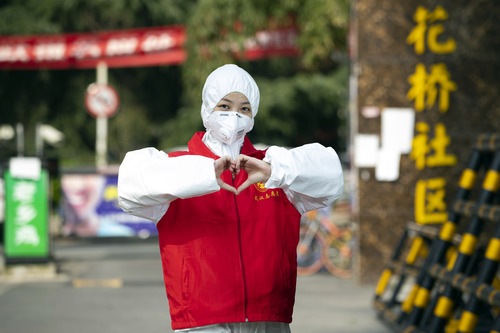
A volunteer who delivers vegetables and medicines to residents poses for a photo in Huaqiao community in Wuhan, central China's Hubei Province, March 7, 2020. (Xinhua)
Wu Jing (pseudonym), a 35-year-old, never imagined that he would ever spend so much time calling strangers, that is until he began working as a volunteer in the COVID-19 fight.
The man who works in Beijing followed his wife back to her hometown Huanggang, one of the hardest-hit cities in Hubei Province, on Jan. 21 for the Spring Festival, which fell on Jan. 25 this year.
Since then, they have been stranded there as the city also went into lockdown following Wuhan and could not return to their posts in Beijing.
Wu was recommended by his colleagues to volunteer with the Chinese Red Cross Foundation (CRCF), which provides a humanitarian fund for medics involved in the prevention and control of the epidemic.
Every morning, Wu would get a list of the medical staff who applied for funding. His job is to contact the applicants by phone to verify their private information, such as nucleic acid test results, ID numbers and bank card numbers, and assist them to submit materials to the fund management committee.
He thought it would be a piece of cake to make some phone calls. However, unexpectedly, he was mistaken for a fraudster by many people at the beginning.
Some applicants did not answer the phone at all, while others hung up before he could speak. When people reluctantly talked to him, they often had a series of questions for him to answer.
"Which organization are you from? What's your employee identification number?" they questioned.
Furthermore, some people even chose to notify the police.
On the afternoon of Feb. 5, Wu called a nurse who was diagnosed with COVID-19.
"Are you a fraudster?" she questioned, after he introduced himself.
Wu explained patiently and added her on the social media platform WeChat to facilitate the further gathering of application materials.
"I sent her the links to the CRCF official website, media reports and previous public information about the fund to identify myself as a volunteer." said Wu.
Late the next night, Wu received a call from the police. The police officer asked him some details about the fund and said they would check the information according to his explanation.
After some time, the nurse he had called before got in touch with him and admitted that it was her who had phoned the police.
Still, Wu helped the nurse to submit the application materials. Later, both she and her colleagues received the funding.
As of Feb. 27, the fund had raised 391 million yuan (56.37 million U.S. dollars) and sponsored 1,111 frontline medical workers, according to the CRCF.
Recently, he saw a nurse share a video on her WeChat page. The video showed she was still lying on her bed in hospital, but the caption read, "Let's meet in Wuhan and enjoy cherry blossoms in the warm spring."
"I believe that day is not far away," Wu said.

